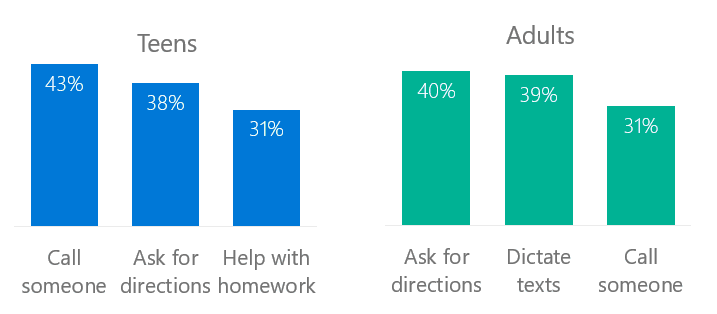Voice Search Website Optimization – Why You Need to do it Now
Siri and the other virtual assistants that came after its debut have transformed the ways that many people search for content online. Voice search is here to stay, but many businesses are missing out on the opportunities that this presents them with.
The audience that relies on Cortana, Siri and their other, lesser known counterparts is growing daily. Nearly 40% of those who use voice search have only started using it in the last year, showing how rapidly this technology is growing.
The most important thing to think about when you start considering your voice optimization options that target voice search is the way that people ask their virtual assistants for information. Search for something in Google, then use your own virtual assistant to try and find the same information. Did you use the same words? Odds are you didn’t. The Internet is full of savvy searchers who can type keywords into Google, but when most of us ask our virtual assistants to locate information for us, we tend to ask the question the way we would of another person: in complete, or nearly complete sentences, using lots of extra words.
This means that the biggest shift in optimization strategy comes in learning to predict what longer form questions people are going to ask their virtual assistants when looking for businesses like yours. You can’t stop when you predict a handful of keywords that should provide visitors with a path to your site, but have to instead consider the actual questions that they would ask when looking for your products or services via a virtual assistant.
Two key factors to consider here are the types of questions your customer service team gets asked, and the types of comments that come in via your social media channels. These may both give you some insight into what people are thinking when looking for information from your business.
Below is a graph of number of people in the US using personal assistance voice search on smartphones (sorted by age group)

Google Always Identifies Growth Markets, and Voice Search Proves it
Google is always at the forefront when it comes to online search, and if the popularity of this type of searching continues to grow, Google is going to start favoring sites that provide the highest quality answers to customer queries.
So, what does this mean for you? First it means that pure keyword marketing is going the way of the dinosaurs. Instead, you need to market your site in terms of the actual questions that it answers. This means that you have to provide a website that provides the emotional and intellectual connection that customers are looking for, meeting their needs perfectly. The closer you can get to this ideal, the more likely it is that any changes coming in the search world are going to reward you.
The below chart describes how teens and adults use voice search on the smartphones

Small Businesses Should Embrace the Voice Searching Opportunity
For years, massive online search has been a difficult sandbox for some small businesses to play in, but voice search actually provides an opportunity to these types of companies. This is because of the local nature of many voice searches. People tend to ask “where is X type of store near me” and local, small companies that capitalize on marketing towards these types of queries could certainly experience business growth as this type of search continues to increase in popularity.
So, what types of actionable factors should you consider to help make the most of this trend?
- Remember that not everyone speaks English. This means that having versions of your site targeted to speakers of different languages can be very important for capturing voice searchers
- Make sure any listings you have on Google, Yelp or similar directories are very up to date and complete as much information as possible.
- Focus on long-tail keywords that are likely to meet specific customer demands rather than vague, generic terms for the industry that you’re in.
- Any content on your site should also have a local bent to it. Focus on ways of phrasing or describing your location that locals would understand, as they may phrase things this way when searching using a virtual assistant.
Example of text search vs voice search:
Text Search: Steve Jobs
Voice Search: Find information about Steve Jobs
Text Search: Restaurants Chicago
Voice Search: Find restaurants near me
Voice Search is a Much for Mobile Queries
Along with this focus on voice search, you can’t overlook the fact that most people are conducting their voice searches via their smartphones. This means that your site must absolutely be mobile friendly as well. If you’re not already on the mobile optimization bandwagon, it’s time to hop on with these tips:
- Shrink your images down to more manageable sizes, as large image files will be awkward and slow loading on mobile browsers.
- Google wants everyone to have a site optimized for mobile, so to reach that end they have provided a free tool to test whether or not a site is mobile friendly. Take advantage of this tool, as it can provide you with very valuable information.
- Remember that Flash doesn’t work in all mobile formats, and that the more widgets, gadgets, pop-ups, flash and other elements that you have on your site, the larger the risk is that it won’t work properly on mobile. Keeping it simple is key.
Chances are you haven’t started adapting your site to take voice search into account. However, by doing so now you give yourself a chance to get ahead of the pack, and start pulling in your share of business through this quickly growing search method.
Related Business Advice
Learn About Digital Marketing
Email Marketing Software and Pricing